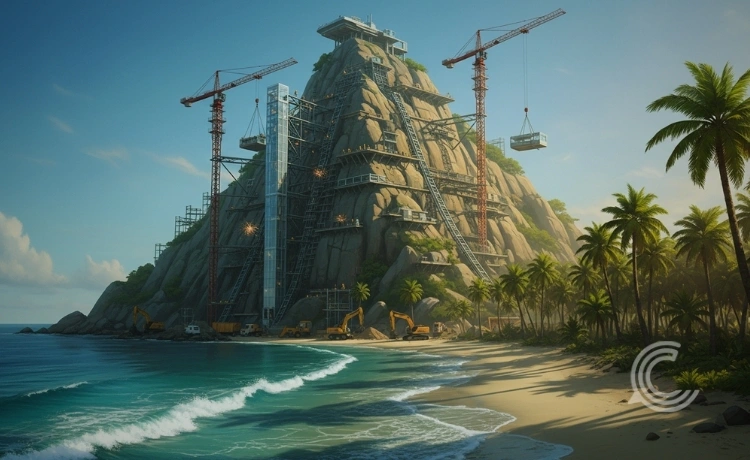Bali’s Kelingking Beach Glass Elevator Triggers Environmental Outrage

Key Highlights–
- The Kelingking Beach glass elevator project in Bali has outraged locals and environmentalists.
- Indonesia’s government backs the project despite lacking a full environmental assessment.
- Locals say the multimillion-dollar structure ruins the island’s natural beauty and defies sustainable tourism goals.
The turquoise-blue cliffs of Bali’s famed Kelingking Beach, known for its dinosaur-shaped silhouette, are now overshadowed by controversy. A 182-metre-tall glass elevator under construction on the Nusa Penida coastline has ignited local and global outrage, with many accusing authorities of prioritising tourism revenue over environmental protection.
Controversy Hits Bali’s Kelingking Beach Over Glass Elevator Plan
The project, spearheaded by China Kaishi Group, began in July 2023 as part of a multimillion-dollar tourism initiative. Promoted as “the world’s first cliffside sightseeing elevator,” it promises to shorten the dangerous two-hour trek from cliff to shore into a one-minute ride. Developers claim the lift will improve safety and accessibility for the nearly 35% rise in visitors the area has seen since 2023.
However, the controversial Kelingking Beach Glass Elevator project is facing intense global backlash. Viral videos exposing the massive steel structure dramatically cutting into the island’s pristine cliffs have ignited international condemnation, sparking fierce criticism over its destructive environmental and aesthetic impact on one of Bali’s most iconic natural landmarks.
Controversial Bali Glass Elevator Project Officially Halted In Tourist Hotspot Nusa Penidahttps://t.co/y3p3XejOVs#bali #travel #tourism
— The Bali Sun (@thebali_sun) November 3, 2025
Drawing sharp criticism from residents who say the once-pristine view has been destroyed. “It’s a shame that the beautiful view of Kelingking Beach has been destroyed,” resident Made Sediana told The Bali Sun. “Tourists visit to enjoy the panorama, not the lifts.”
Government Support Despite Missing Environmental Checks
Despite widespread backlash, Indonesia’s Tourism and Creative Economy Ministry has continued to back the Kelingking Beach Glass Elevator project, describing it as part of a commitment to “sustainability, safety, and cleanliness,” according to local news agency Antara.
However, officials temporarily suspended construction on Friday, after admitting the developer lacked several necessary permits and that no full environmental impact assessment (AMDAL) had been completed, an essential requirement for projects of this scale under Indonesian law.
“If the project violates spatial regulations, enforcement must proceed,” said I Made Supartha, head of Bali’s planning and permits committee, as reported by The Guardian. Additionally, environmental experts have stated that the government oversight should have come much earlier, questioning how construction reached an advanced stage even before assessments were flagged.
Tourism vs. Sustainability in Bali’s Future
Indonesia’s tourism ministry has defended its involvement, insisting the project will ultimately benefit the local economy by encouraging longer visitor stays. Deputy minister Hariyanto told Tempo Magazine that tourist numbers have “remained high” despite construction, and that the elevator could “further boost Bali’s tourism potential.”
Critics, however, see the project as another example of unchecked commercialisation in Bali. Niluh Djelantik, a Balinese senator and environmental advocate, said she would “never ride the elevator,” calling it symbolic of how unsustainable development threatens the island’s fragile ecosystems.
Also Read | Starbucks to Sell Majority Control of China Business to Boyu Capital in Growth Push
Furthermore, she warned the Kelingking Beach Glass Elevator project risked escorting visitors “to the gate of disaster”. Notably, Kelingking Beach remains closed to swimming at all times due to its deadly rip currents. A French tourist died two weeks ago after entering the dangerous waters, reportedly disregarding multiple, explicit warnings against swimming at the high-risk location.
Kelingking Beach Glass Elevator Sparks Debate on Bali’s Conservation
While the elevator’s developers maintain that the structure will serve a dual purpose, including acting as a crucial rescue route for beach evacuations. However, critics vehemently argue that maximizing tourist access must not come at the expense of Bali’s invaluable natural heritage.
As environmental protests grow louder, both locally on Nusa Penida and across online platforms, Indonesia’s government faces renewed scrutiny over its infrastructure-driven tourism policies. With construction currently paused pending further review, the Kelingking Beach Glass Elevator project has become a lightning rod for the global environmental movement and a stark representation of Bali’s difficult tightrope walk between rapid economic development and essential environmental conservation.



